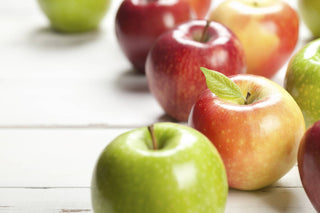As if the other symptoms of menopause aren’t bad enough, one of the major issues postmenopausal women face is a drastic increase in the risk of cardiovascular disease. Fortunately, there seems to be mounting evidence that consuming just two apples a day can have a significant effect in lowering cholesterol in as little as 3 months.
The August 2012 issue of the Journal of the Academy of Nutrition and Dietetics features a study of 160 post-menopausal women by Dr. Sheau C. Chai and her colleagues at Florida State University. As part of the research, participants were randomly assigned to one of two dietary intervention groups to see whether consumption of dried apples or plums would have an effect on cholesterol levels.
The first group was instructed to consume 75g of dried apple daily (about the equivalent of two medium-sized apples), and the second group was instructed to consume 100g of dried plum (prunes) daily. Blood samples were taken from each of the women to measure cholesterol and inflammatory molecules in the blood at baseline, and then at three, six, and 12 months.
What You Need to Know About Cholesterol
Results
The results were surprising. At three months, total cholesterol among the apple eaters had reduced by 9%, and LDL or “bad” cholesterol dropped by 16%. At six months, total cholesterol had reduced by 13% and LDL cholesterol by 24%. Those levels seemed to plateau and remain the same at the 12-month mark. Still, the reductions were large enough to be statistically significant and correlate the apple consumption with cholesterol reduction.
On the other hand, for those in the plum-eating group, total cholesterol was reduced by 3.5% and LDL by 8% at 12 months. Unfortunately, the reduction was so minimal it could not be considered statistically significant, as the difference in cholesterol levels could be due to chance.
Both groups lowered their levels of the inflammatory marker C-reactive protein (CRP). The plum group saw the fastest decrease – 17% after 3 months – while the apple group saw a greater decrease of 22% by the 6-month mark and 32% by the end of the study. Lipid hydroperoxide levels – the products of free-radical damage on lipids – also saw a decrease, with the plum eaters reaching 33% and the apple eaters 38%, respectively.
And some more good news? The extra calories from apple consumption (about 240 calories) actually led to weight loss. Participants lost an average of about 3.3 pounds over the course of the study.
Study co-author Dr. Bahram H. Arjmandi says in addition to the cholesterol and inflammatory compound reduction apples provide as well as their antioxidant benefits, “reducing body weight is
The Bottom Line
Keep in mind that while a drop in “bad” LDL cholesterol is a step in the right direction, it’s not a guarantee that simply eating apples will prevent or cure cardiovascular disease. The only way to do this is to be aware of cholesterol levels with regular testing (the NIH recommends people 20 and older get tested every 5 years) and having a healthful diet and lifestyle.
Dietary & Lifestyle Modifications to Improve Cholesterol
A cholesterol-friendly diet is one high in fruits and vegetables, low in saturated, partially-hydrogenated and trans-fats, and high in Omega-3 fats. It should also include plenty of soluble fiber.
Because our bodies can’t break down cholesterol once it’s been made, it is eliminated as bile; dietary fiber intake increases the removal of cholesterol so that it does not get reabsorbed. This explains why vegetarians - who don't consume as much saturated fat because by they don't eat meat and whose diet features fruits and vegetables which are high in fiber - have lower blood cholesterol levels.
Given fiber’s role in helping to remove cholesterol from the body, it’s not surprising that apples, due to their high fiber content, are helpful in managing cholesterol levels. Fiber also helps keep you feeling full longer, and coupled with the fact that they are low in calories, apples make a great snack.
Although a number of apples are available throughout the year, by September, look for a wider assortment as apples come into season. Look for firm apples with rich color and smooth skin. If you like them sweet, try the Fuji or Gala varietals, and if you like tart, Granny Smith and Pink Lady apples are great. Red and Golden Delicious are right in between, and one of my personal favorites is the Jazz apple, both tart and sweet.
Apples really are a terrific treat from nature. In addition to the fiber benefits, pectin and polyphenols improve lipid metabolism in the body and lower the production of substances that support inflammation. Apples also contain phytonutrients that have antioxidant properties, including quercetin, catechin, phloridzin and chlorogenic acid. So, even if your cholesterol levels are not an issue, apples can still be of benefit to your health.

